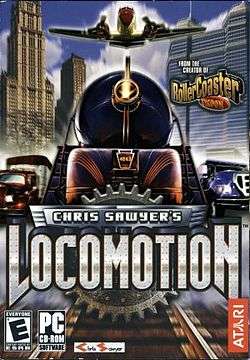Chris Sawyer's Locomotion
| Chris Sawyer's Locomotion | |
|---|---|
 | |
| Developer(s) | Chris Sawyer |
| Publisher(s) | Atari |
| Designer(s) | Chris Sawyer |
| Composer(s) | Allister Brimble[1][2] |
| Platform(s) | Microsoft Windows |
| Release | September 2004 |
| Genre(s) | Business simulation |
| Mode(s) | Single player, Multiplayer |
Chris Sawyer's Locomotion is a computer game by independent game developer Chris Sawyer from 2004. In his words, it is "the spiritual successor to Transport Tycoon".
Gameplay
The game allows the player to use railroads, trams, trucking lines, buses, airplanes and ships to earn money in a transport company between the years 1900 to 2100. It contains over 40 pre-designed scenarios and a scenario editor, and can also be played in multiplayer mode with another human-controlled competitor. The game is played in an 2D isometric view like the other games by Chris Sawyer, particularly RollerCoaster Tycoon, which uses the engine that was originally developed for Transport Tycoon.[3]
Scenarios
The scenarios have five difficulty levels: Beginner, Easy, Medium, Challenging and Expert. Different objectives are available, some require the player to finish on a certain position in the company ranking list while others require the transportation of a specific amount of cargo. In some cases these objectives have additional limits, such as that the player must finish within a certain time limit.
While many of the scenarios are fictional, some are based on real-world countries such as the United States, Switzerland, and the United Kingdom.
Third party add-ons
In recent years, several add-ons have been created for the game, including hundreds of trains, trucks, airplanes and other vehicles. Some people have used special programs to convert Microsoft Train Simulator rolling stock for use in Locomotion.
History
Locomotion was developed by game developer Chris Sawyer as "spiritual successor to Transport Tycoon". The game was published and released by Atari in the U.S. on September 7, 2004 and a few days later in the rest of the world.
In 2013 an iOS version of Transport Tycoon was released that uses the graphics from Locomotion.[4]
On March 17 2015, the game was re-released for digital download on Steam and gog.com.
Critical reception
Reviews of the game were generally not favorable, with many noting that the game's user interface and AI were both poor in comparison to the original Transport Tycoon. However, the AI algorithm had expanded since Transport Tycoon Deluxe, such that it would now build two-way routes and avoid constructing loops. Sabotage of the rival companies' vehicles, prevalent in Transport Tycoon, has been reduced but not entirely eliminated. Further, rival companies can never be bought over by the player's company.
References
- ↑ "Portfolio". Orchestral Media. Orchestral Media Developments. 4 October 2008. Retrieved 30 April 2016.
- ↑ "Customer Support, Technical Support, Game Enquiries". Chris Sawyer Software Development. Retrieved 30 April 2016.
Cinematic orchestral music for video games by Allister Brimble and Anthony Putson. Allister created the music and sound effects for RollerCoaster Tycoon 1 & 2, and Chris Sawyer's Locomotion.
- ↑ Gamespot Staff (2 April 2004). "RollerCoaster Tycoon designer offers first details on new title". GameSpot. Archived from the original (Interview) on 7 Oct 2009.
- ↑ Brookes, Tim (14 October 2013). "Transport Tycoon Review: Infrastructure Has Never Been So Fun". MakeUseOf. Retrieved 24 March 2014.
External links
- Chris Sawyer Software Development, website of Chris Sawyer (designer and developer)
- Locomotion at MobyGames
- Locomotion Depot, an enthusiast website
- Locomotion at Atari (publisher)
- Locomotion at GOG
- Locomotion at the Humble Store
- Locomotion at Steam